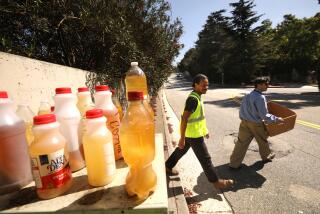Border war at heart of litter case
- Share via
LAS VEGAS — Walt Staton wanted to help people, and his tool was a water jug. On the morning of Dec. 4, he and three others drove southwest from Tucson, to the Buenos Aires National Wildlife Refuge, which tens of thousands of illegal immigrants traverse each year.
But the U.S. Fish and Wildlife Service said the plastic jugs he left for the immigrants endanger wildlife, and this week Staton was sentenced in federal court in Tucson on a charge of littering. He was given one year of unsupervised probation and ordered to spend 300 hours picking up trash.
The sentence, however, does not quite capture the emotions surrounding the case -- yet another testament to the volatility of the illegal immigration debate in Arizona. Prosecutors had asked for a $5,000 fine and five years’ probation. Staton, for his part, had insisted on a trial, rather than pay a $175 fine.
In recent months, as the legal proceedings progressed, each side has essentially accused the other of staging a show trial to bolster its view of U.S. border policy.
Staton, a 27-year-old Web designer and soup kitchen volunteer, viewed his actions as humanitarian. As he had done for five years with the faith-based aid group No More Deaths, Staton in December lugged water up hills and through scrub to remote, migrant-carved trails. Only this time, when he and his comrades returned from leaving eight jugs at their last stop, authorities were waiting, and he was cited by a Fish and Wildlife Service officer.
Staton joined No More Deaths in 2004, after graduating from the University of Arizona. Volunteers hike the heavily trafficked refuge -- about 54,000 immigrants passed through in 2008 -- during often-sweltering days, offering food, water and medical help to anyone they find. Some migrants have died while crossing the punishing desert.
But most border crossers travel at night, so No More Deaths also leaves water bottles along the refuge’s 1,300 miles of migrant trails. “It’s a human rights issue, from our perspective,” group spokeswoman Danielle Alvarado said. “We have people crossing and dying in our desert.”
Mike Hawkes, manager of the Buenos Aires National Wildlife Refuge, said he has no problem with providing water to illegal immigrants -- another aid group, in fact, runs three stations, each with two 55-gallon water drums and spigots. Stray bottles, though, can endanger mule deer, mountain lions and other wildlife, which might eat chunks of plastic or catch their antlers or paws on them, he said.
The refuge, which also harbors the endangered masked bobwhite quail, is often strewn with backpacks, T-shirts, pants and a stadium’s worth of water bottles, mainly from border crossings, Hawkes said.
He has suggested that No More Deaths chain jugs to trees so border crossers -- thought to each leave 5 to 8 pounds of trash -- can refill their water bottles, not dump them for new ones.
“It was like they had blinders on: ‘Put water bottles on the trails, that’s all we can do,’ ” he said.
After several verbal warnings, Hawkes said, a member of the group was cited for littering in February 2008. Daniel Millis received a suspended sentence and fine, which he is appealing, Alvarado said.
Staton, in turn, refused to pay the $175 fine and set off a more heated war of words. The government, which Staton’s lawyer estimated spent about $50,000 to prosecute him, broadly criticized him in a sentencing memo for what officially was a littering case. Attorneys, for example, noted that No More Deaths volunteers often wrote “buena suerte,” or “good luck,” on the water jugs.
“The obvious conclusion is that the defendant and No More Deaths wish to aid illegal aliens in their entry attempt,” the memo said.
“His actions are not about humanitarian efforts, but about protesting the immigration policies of the United States,” the memo said. A U.S. Attorney’s Office spokeswoman declined to comment Wednesday.
Arguing that Staton had “haphazardly left water for illegal aliens, drug smugglers and/or dangerous felons,” prosecutors succeeded in persuading a judge to prohibit him from setting foot in the refuge during his probation.
A federal jury convicted Staton in June of littering, a misdemeanor, and U.S. Magistrate Judge Jennifer C. Guerin sentenced him Tuesday. In addition to the probation and trash duty, he was banned from the 7-mile-wide refuge that hugs the U.S.-Mexican border.
Staton, who considered the sentence too stiff, found the whole thing surreal. In his mind, the prosecution was solely about immigration policy. The Sierra Club and Center for Biological Diversity -- environmental groups that don’t take littering lightly -- even submitted letters advocating a light sentence for him.
“I wanted to make a point that humanitarianism is not a crime, and water’s not littering,” said Staton, who is moving to Pomona this month to attend the Claremont School of Theology.
In recent weeks, No More Deaths members flew to Washington and discussed quelling the squabble with Interior Department staffers. But the group also readied itself for another battle: Last month, 13 more volunteers were cited in the refuge for setting out water jugs.
The Arizona Daily Star concluded that both sides ended up looking petty:
“Refuge officials,” said an editorial, “are coming across as heartless bureaucrats for confiscating water bottles that could potentially save lives. . . . No More Deaths, meanwhile, is coming off as a bunch of activists who refuse to follow the law.”
--
More to Read
Sign up for Essential California
The most important California stories and recommendations in your inbox every morning.
You may occasionally receive promotional content from the Los Angeles Times.










